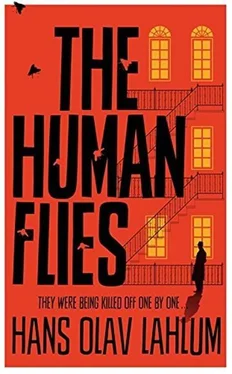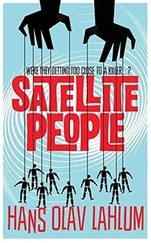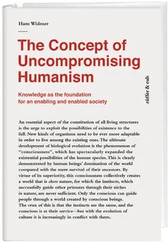Patricia was on a roll now and carried on tirelessly.
‘So, in the spirit of Agatha Christie, the main question therefore must be, who stood to gain so much from Harald Olesen’s death that they murdered him? And by extension, why was there a need to kill him now – when he did not have long to live anyway?’
‘Perhaps the murderer did not know he was ill?’ I suggested.
Patricia nodded, but then shook her head.
‘That is, of course, perfectly possible, but I still believe that it is more likely that the murderer knew about the illness, and that, paradoxically, was the very reason why things had to happen fast.’
Naturally, I could not resist asking why. I was not entirely sure what sort of answer I expected; it definitely was not the one I got.
‘Because there was no murder weapon at the scene of the crime.’
Again she smiled at my confusion. Her smile seemed to me to be a rather arrogant and unlikeable side of her nature, but I was too interested in what she had to say to give it any further thought.
‘I have to admit that the conclusion is somewhat speculative, given there are so many unknown factors, but it is very odd. If you had found a murder weapon near the body, the case would probably have been interpreted as an obvious suicide. Leaving a weapon behind would have been a far more obvious choice than this advanced idea involving the stereo player. The fact that the murderer did not use the option of leaving the gun behind would indicate that the murder was committed earlier than planned. The only other explanation I can think of is that the murderer wanted to demonstrate that it was a murder and not a suicide. No matter what, the question as to why it happened now is currently almost inseparable from the question of why it happened. His will and the money that was missing from his account are obviously both of great interest in this connection. You should follow up both questions as soon as possible after the weekend. In the meantime, I suggest that you ask the neighbours if they can provide the investigation with information regarding their finances. It will be of considerable interest simply to see who answers “yes” or “no” to this.’
I nodded, and immediately followed up with a new question.
‘Do you think that this is essentially about money?’
Patricia thoughtfully nibbled on her carrot for a minute or so before answering.
‘The money may be decisive, but I think it is a lead more than a solution, and that this is about something more important and more serious. In any case, there are already several clues that point back to the war.’
I thought to myself once again that people who claimed that money was not important for some reason always seemed to have plenty of it. But before I could decide whether to mention it or not, she pushed on to new heights.
‘In short, I do not think we are looking for someone who functions normally. I believe we are looking for a human fly.’
Despite the fact that my knowledge of zoology is perhaps better than average, I have to confess that this was an unknown species to me – and I certainly did not understand why she was talking about it now. Having wracked my brains for a minute or so, I had to swallow the bitter pill and ask what she meant. She attempted to give an apologetic smile, without much success.
‘I am sorry – I wasn’t thinking. It is a concept that I made up myself and have used so much since that I forget that it is not something that other people understand. But I do think that it may be relevant here. There are a good many people who at some point in their lives have experienced something so painful and traumatic that they never get over it. They become human flies and spend more or less the rest of their life circling round what happened. Like flies round a rubbish tip, to use a simple analogy. I think that Harald Olesen himself, behind his suit and mask, was in fact a human fly. And I have a strong suspicion that he was killed by another one.’
I now understood what she meant – and immediately saw a possible link to my own preliminary theories.
‘Which would point to Konrad Jensen?’
Patricia wagged her head thoughtfully before answering.
‘Yes and no. At the moment, Konrad Jensen is the most obvious human fly among the neighbours. But I suspect that he is not the only one, and I for various reasons doubt that he is the right one. It would be more plausible that he was the murderer if we could find a direct link between his background in the war and Harald Olesen’s.’
I had to agree with what she had said so far. And it suddenly occurred to me that I should ask what her thoughts were regarding the blue raincoat. She lit up when I mentioned it and gave me a much longed-for compliment.
‘You are absolutely right – it may be crucial. Once we have established who threw the blue raincoat away, I think we will be hard on the heels of the murderer. The problem is that it was not found until Friday morning. And I am sure that you did not go through the residents’ wardrobes on Thursday evening in search of a blue raincoat?’
This was my opportunity for a welcome small victory.
‘Of course we did not search their wardrobes for a blue raincoat that we knew nothing about, but I think we can say with reasonable certainty that it was not to be seen in any of the neighbours’ flats late on Thursday night. No one has made a note of a large blue raincoat, and it would not be particularly easy to hide something like that in the event of a house search.’
For a moment I thought that Patricia was about to get out of her wheelchair. For about thirty seconds her eyes flashed and her body tensed.
‘Brilliant,’ she almost whispered. ‘It is still not a determining factor, but may prove to be.’
I waited for further explanation, but soon realized that this would not be forthcoming. So instead I asked what she made of the neighbours’ statements. This time she was quick to answer.
‘There are still an extraordinary number of secrets in that building. The fact that all those people have ended up in the same building is suspicious in itself. The American diplomat is perhaps strangest of all, but the student from Sweden, rentier from Oppland and millionaire’s daughter from Bærum do not really belong on the east side of the river in Torshov either. Some of them may have ended up there by chance – that goes without saying – but that is certainly not the case for all of them. In fact, I suspect that only one of the residents has been completely open and honest so far.’
She stopped abruptly, no doubt knowing that I would ask who. When I did, she gave me the most tantalizing smile and tore a page from her notebook. With her left hand hiding the page, she dashed off some words before folding the paper. Then she rang the bell for the maid. While we waited, Patricia beamed at me with the most disarming and innocent smile.
‘Please forgive my somewhat eccentric behaviour, but it is a shot in the dark that may be wrong. And if that is the case, my speculations must not be allowed to bias your ongoing investigation.’
As soon as there was a knock on the door, she stopped the conversation and held the folded sheet out to the maid.
‘Please put this in a sealed envelope and send it to Detective Inspector Kolbjørn Kristiansen at Oslo Police. You will find the address in the telephone directory. Send the letter this evening on your way home.’
Benedikte looked from Patricia to me, obviously confused.
‘Benedikte, do not try to think for yourself, as it has never been very successful. Benedikte should just do as she is told and then everything will be fine,’ Patricia instructed, in a harsh voice.
The silent Benedikte nodded apologetically, took the piece of paper and hastily withdrew. I felt the episode to be uncomfortable, even though this might be the way they normally spoke to each other. However, I already had more than enough problems without interfering in internal communications in the Borchmann household.
Читать дальше











